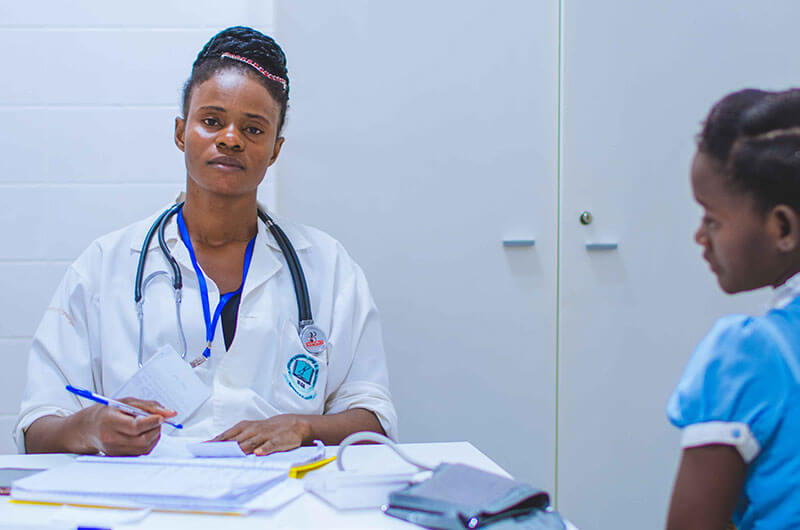The UN Sustainable Development Goals (SDGs) aim to make our lives better by 2030. The third SDG is concerned with improving health and wellbeing around the world. It has a total of 13 targets which include everything from reducing maternal mortality to promoting mental health.
While some people think of only doctors and nurses when health is mentioned, there are several other career paths you can pursue in the healthcare industry that will contribute to the advancement of SDG 3.
Keep reading to find out the 16 common career paths that play a huge role in the attainment of SDG 3 as well as what it takes to pursue them successfully.
- Surgeon
A surgeon is a medical professional who operates on patients with the goal of curing a wide range of diseases and injuries. Within the field of surgery, there are specializations such as heart surgery, orthopedic surgery, and microsurgery.
While requirements vary, the road to becoming a surgeon is generally long and arduous. For instance, if you want to become a surgeon in the United States, you first need to complete a bachelor’s degree before applying to medical schools. Once you successfully complete medical school, you need to pass a licensure exam before proceeding to become a resident. As a resident, you spend between three and seven years gaining practical experience in the surgery room. Finally, you are required to obtain a state licensure which allows you to practice as a surgeon in a specific state. As you can see, becoming a surgeon is a process that requires a deep level of commitment. However, the rewards of working as a surgeon are high– not only do surgeons get paid well but also their work is essential in curing some of the most challenging diseases and injuries out there.
- Gynecologist
A gynecologist is a professional who focuses on female reproductive health. Gynecologists help patients with labor, child delivery, contraception, and other related issues. Within the field of gynecology, one can choose to specialize in different areas such as fertility.
Just like surgery, pursuing gynecology as a career takes time and extensive training. If you are aspiring to work in this field in the United States, you will be expected to complete an undergraduate degree, then pursue medical studies before taking your medical licensing examination. Afterwards, you will be expected to undertake four years of residency where you get more hands-on training on how to become a gynecologist. Finally, you have to sit and pass both written and oral board exams. Working as a gynecologist is a great way to contribute to the attainment of the first SDG 3 goal — reduction of maternal mortality.
- Pediatrician
Pediatricians specialize in treating children. Within the field of pediatrics, there are many subfields such as psychiatry and behavioral pediatrics. To be a pediatrician, you need to be someone who genuinely cares about and enjoys being around children. In addition you need the same kind of intense training that surgeons, gynecologists, and other medical experts need. In the United States, this means getting an undergraduate degree, attending medical school, passing a licensure examination, and undertaking a residency. As a pediatrician, your work with children will contribute to the advancement of the second target of SDG 3, that is reduction of infant mortality.
- Psychiatrist
Psychiatrists treat patients who suffer from mental health issues such as depression, bipolar disorder, and anxiety. Psychiatrists not only assess and diagnose mental health illnesses but also prescribe medications. This is in contrast to psychologists who generally don’t have the qualification to prescribe medications. To become a psychiatrist, at least in the United States, you will need to undergo the same kind of training that other medical experts such as surgeons undergo. This means completing an undergraduate degree, attending medical school, passing your licensure, and training as a resident with an experienced psychiatrist. As a psychiatrist, your work will be crucial in the advancement of the SDG target which deals with improving mental health by 2030.
- Pharmacist
While doctors prescribe drugs, the work of a pharmacist is to dispense those drugs. As a pharmacist, you will also support doctors by ensuring that patients are not taking any medicines that conflict with each other, keeping records and coordinating with insurance companies. The training to become a pharmacist depends on where you pursue your degree. In the United States, for example, you will typically be expected to have an undergraduate degree in the sciences before you enroll for a PharmD degree which takes between three and four years. Once you complete your PharmD degree, you have to sit and pass your licensing exams before you are allowed to practice as a pharmacist. In most developing countries, pharmacists are particularly essential because they complement the limited healthcare workforce.
- Physician
A physician is a medical professional who is the first point of contact for patients. Otherwise known as a primary care doctor – or simply a doctor – a physician checks the medical records of a patient, takes note of the symptoms of a budding illness, and prescribes a course of treatment. If more specialized care is needed, the physician recommends a patient to other professionals such as surgeons, cardiologists, and urologists. Depending on where you undertake your medical training, the training to become a doctor can take anything between six and ten years. In the United States, you first have to pursue an undergraduate degree in a science major or pre-med track before proceeding to medical school where you spend four years exploring different fields of medicine. Once you finish your medical studies, you are required to take a board exam and then work as a resident, which means you will be supervised by an experienced physician for several years. Once you complete this phase, you are now ready for the final step: getting licensed to practice in a state of your interest. While the process may sound almost impossible, many people have done it successfully. In other countries such as the United Kingdom, the road to becoming a doctor is slightly shorter because students are allowed to enroll straight into medical schools before attaining a bachelor’s degree.
- Nurse
Nurses carry out a range of duties in a hospital setting. Nurses will typically evaluate a patient’s medical history, assist in the lab, and guide patients on how to follow their treatment program. While a nurse does a lot of similar work to a physician, the difference lies in their level of training: physicians spend more time in education and training, hence nurses work in tandem with physicians. To be a nurse, you will generally need to spend at least four years acquiring a bachelor’s degree in that field. Depending on the country you pursue your education, you will also be expected to complete some kind of licensing examination. In the United States, this is known as the National Licensure Examination.
- Oncologist
Oncologists are medical professionals who treat cancer. There are three main subfields within the big field of oncology. These are surgical oncology, radiation oncology, and medical oncology. As you can probably tell from these terms, surgical oncologists focus on treating cancer using surgery; radiation oncologists use radiation such as x-rays; and medical oncologists use methods such as chemotherapy and immunotherapy. The work of an oncologist generally involves diagnosing cancer, relaying possible modes of treatment, and helping patients to deal with the side effects of treatment. To become an oncologist, you will need to undergo rigorous training. In the US, this means completing an undergraduate degree, taking the medical school admission tests, attending medical school for a period of four years, and pursuing a residency that will last between two and five years. After this, you will need to get licensing before you are allowed to practice. The work of an oncologist is essential in the achievement of the fourth target of SDG 3 which aims at elimination of non-communicable diseases such as cancer and diabetes.
- Dentist
Dentists are professionals who exclusively focus on teeth and gum health. If you need your teeth extracted or have dentures fixed, dentists are the professionals you consult. To become a dentist, you will need intensive training. First, you will have to pursue an undergraduate degree in the sciences or pre-med track. Next, you will have to apply for dental school where you will spend four years training. Afterwards, you will need to pass board exams before you are allowed to practice. Just like medicine, this procedure only applies in the US – in some other countries, students are able to enroll directly into dental school without acquiring an undergraduate degree first.
- Radiologist
A radiologist specializes in diagnosing and treating diseases using technologies such as x-rays and MRI (magnetic resonance imaging). Becoming a radiologist takes time and effort. If you plan to pursue this path in the United States, you will have to get an undergraduate degree, attend medical school where you learn all about radiation treatment and its management, complete a residency, and finally acquire the required licensing examinations. The work of a radiologist is essential in the achievement of the SDG 3 target that aims to eradicate diseases such as cancer.
- Lab Technician
Lab technicians are essential in the healthcare industry because they are responsible for analyzing samples to determine whether patients have a certain illness or not. Their other roles include proper storage of chemicals and tools used in a hospital setting. The route to becoming a lab technician is considerably shorter than that of becoming a nurse or a physician. In the United States, lab technicians generally have to complete an associate’s degree that takes two years. After that, they have to take the American Society of Clinical Pathology exam before finally getting the licensure to practice in their states of interest.
- Nutritionist
Nutritionists are professionals who advise patients how to eat well in order to manage conditions such as diabetes. Becoming a nutritionist involves getting an undergraduate degree in fields such as food science and clinical nutrition. Once you have completed your undergraduate degree, you may need to pursue a master’s degree before you pursue internships in the field. Like most other professions in the healthcare field, you will also need to obtain the licensing required by the state or the country you wish to practice in. The work of a nutritionist is particularly important because eating well is one of the best ways to avoid diseases such as cancer, diabetes, and many others. In the developing world, the right information from nutritionists can help stave off problems such as malnutrition that are widespread.
- Midwife
Midwives assist women with pregnancy and childbirth. Qualifying to work as a midwife will depend on where you are based. In some countries, midwives usually have little formal education – they gain all their experience by training under experienced midwives. In other countries, such as the United States, becoming a midwife involves getting a degree in nursing first before pursuing a midwifery program and passing the required board exams. The work of qualified midwives is essential in attaining SDG 3 targets such as reduction of both infant and maternal mortality.
- Epidemiologist
An epidemiologist is a professional who studies patterns of disease. Epidemiologists work in hospitals, universities, government institutions among other places. Before you qualify to work as an epidemiologist, you will need to typically pursue a degree in the sciences at the undergraduate level and then acquire a master’s degree in the field of epidemiology or public health. Once you complete your advanced education, you will need to pursue more training through internships, fellowships and full-time opportunities. Epidemiologists are highly important in the eradication of diseases because their work informs how authorities respond to diseases— particularly infectious diseases such as ebola and Covid-19.
- Community Health Worker
Community health workers serve as a bridge between the community and healthcare systems. Some of the roles that a community health worker performs include visiting homes, educating the community about health issues, supporting mothers and their infants, collecting useful health data, and performing first aid when needed. Unlike nurses and physicians, community health workers generally don’t undergo lengthy training. Because they are typically members of the same community they work in, community health workers are excellent advocates of better health. Through education and setting an example, they can contribute greatly in improving the health of a community. To become a community health worker, you will generally need to undergo short training with organizations that focus on improving community health.
- Anesthesiologist
Anesthesiologists work closely with surgeons. Their work entails preparing patients for surgery by administering an anesthetic that makes surgery as painless as possible. To work as an anesthesiologist, you will need to complete undergraduate studies, attend medical school, and be a resident for a period of about three years. Just like medicine and surgery, you will also need to pass the required board exams and acquire a licensure in the state or country that you want to work in.
Conclusion
As you can see, the healthcare industry offers a wide range of opportunities. No matter your level of skill or education, there is something for everyone.
Undertaking a career in a health field is one of the most impactful ways of advancing the third Sustainable Development Goal.
If you are curious about more career options in healthcare, check out this resource from the Bureau of Labor Statistics and our article on soft skills needed to thrive in health.
Do you want to learn more about studying abroad and exploring new scholarship opportunities?
Check out our robust scholarship research tool and follow us on Medium, Twitter, Facebook, and LinkedIn!




